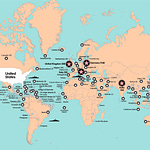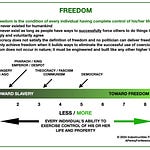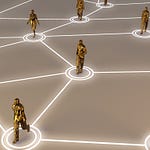Some people might believe the world is as good as it can get. Even if they concede that all the current wars are tragic, that murders are unfortunate, and that all the harm to all the innocent men, women, and especially the children worldwide is a bad thing, some might still believe that we should leave everything just how it is because it’s not possible to have a better world that we have today.
However, if you think there might be ways to improve the world you quickly run into the problem of getting people to agree on what the goal should be. For example, from a religious perspective, you might find people who believe the answer is for eight billion people to all accept Christ as their personal savior. All problems solved! But someone else thinks the answer is for eight billion people to live under Sharia Law. Problems solved!
Similarly, when it comes to economic systems, people are divided on what the best structure should be. Some people think a 65% income tax, plus a 20% Value Added Tax on everything else is close to perfect. Some think it should be half that. A few, like me, think it needs to be zero if the tax is going to be collected by force. There’s no chance of wide agreement.
Is Anything Universally True?
There are some things that can be said to be universally true. If you traveled to the other side of our galaxy and met intelligent beings they would know about triangles. And the internal angles of all their triangles would always add up to 180 degrees. Of course, they wouldn’t call them triangles, or measure in degrees, or use our number system, but whatever they used it would be the exact equivalent of 180 degrees. The same with their measurement of the ratio between the diameter of a circle and the circumference. It would always be our pi. Those appear to be universal truths.
It’s much less likely they would all know the story of Moses, or insist on Sharia Law, or that Karl Marx was a brilliant economist.
So on this planet we have our work cut out for us when we try to find things upon which we can all agree. The reality is, outside of math, there might be nothing we can all agree on. (And yes, even in advanced mathematics there is plenty of disagreement to be found.)
How Close Can We Get?
Humans have some characteristics that always apply. No matter how well your kidneys are functioning, they won’t filter the blood in my body. When I learn the names of all the moons of Jupiter you don’t spontaneously know them just from sitting next to me. We are biologically autonomous. Yes, most of us are social and benefit from interaction, but we aren’t built to absolutely require another person’s life force in order for us to live.
So from that, could we agree that our individual lives and bodies are very important to each of us? Could we agree that my body is mine and your body is yours? And my life is mine and your life is yours?
The honest answer is that not everyone agrees on that. I’m loath to invoke Hitler at this point, but he represents a profound example of evil and a disregard for individual autonomy. Hitler clearly did not agree that your body is your body. He believed something along the lines of the State being more important, and the human gene pool being more important, and his right to interfere with people’s lives and property so he could achieve everything he thought would make the world better. It took about 60 million lives and immeasurable property to stop him from going farther.
Yet, if put to some kind of simple vote, couldn’t most of us agree that my body is mine and your body is yours, and that my life is mine and your life is yours? Might half the world agree on that? Or one in five of us? (I’m trying to be realistic here.)
And even for the people who would say, “Nope. It all belongs to God,” wouldn’t they agree that they should decide which God their life and body belongs to, not someone else forcing that decision on them?
How Much Agreement is Sufficient?
Personally, when it comes to improving the world I’m very focused on the individual and it’s largely for the reasons alluded to above. The individual person is the smallest part of a society. They are the atoms that make everything else in the human world possible.
I’ve mentioned elsewhere the definition of Freedom that I use: “Freedom is the societal condition that exists when every individual has full (i.e. 100%) control over his or her own property.”
The most fundamental property that each of us has is our life and body.
How many people in the world could agree that they own their own life and body and that nobody has a right to take those from them or, in fact, do anything to them without explicit permission?
Most people I speak to would agree on this, but I don’t know anything about the cultures in Nigeria or Borneo. Would people there agree on this basic premise? Would millions of Chinese and Indian individuals agree?
How many of them would instead prefer to be slaves against their will? How many would prefer to be commanded by an authority figure? That number is not zero. But I’m hoping it’s lower than the number of people would would prefer to be self-sovereign of their own life and body.
What If We Were Networked and Organized?
I’m hoping, and at this point it’s no more than a hope, that given an explanation of this principle, many people would want to live in a system that recognized that they alone are the owners of their own life and body.
Let’s say one billion of eight billion people see this the way I do. Imagine if a billion people were connected, not through a central authority but by voluntary mutual agreement, each respecting the autonomy of others and agreeing to act only in ways that protected the life, and property of everyone in the network. (See, how I sneaked property in there? It’s a longer discussion, but I’m also saying that when you use your own life energy to create something, you own that thing, not the guy next to you who never learned how to make it or used his own life energy to create it.)
So in simple terms, when Obinna in Nigeria has his bicycle stolen by Tayo, everyone in the network agrees not to interact or trade in any way with Tayo until he returns Obinna’s bicycle and pays him, say, $50 for his trouble. So Tayo suddenly has trouble buying groceries, or getting his mobile phone to work, or turning on his electricity at home. Because the people around him don’t support theft or thieves. They agree on that one thing.
Importantly, there is no force or coercion in this system. There is also no central authority saying some people can steal and some can not. The people in this network also don’t wish any harm to come to the thief. They just won’t trade with him. And the thief knows what the restitution is and that all of it goes to the victim. Once the restitution is made, Tayo can even join the network. (Albeit possibly with a stain on his reputation, which is incentive to not repeat the whole scenario.)
Is this system possible? Does it defy any laws of physics, and therefore become impossible? Could it be enabled with today’s technology? Could it start with a few thousand people in a small community? Could those small communities eventually network with other communities?
Is there any of this that some of us could agree on? How many people does it take to be viable?
I am interested in hearing your thoughts.













Share this post